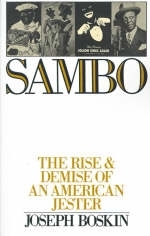
Sambo
The Rise and Demise of an American Jester
Seiten
1988
Oxford University Press Inc (Verlag)
978-0-19-505658-7 (ISBN)
Oxford University Press Inc (Verlag)
978-0-19-505658-7 (ISBN)
Drawing on primary sources and scholarly studies of American life and literature, drama, material culture, cartoon art, advertising and popular entertainment from minstrel shows through motion pictures, radio, and television, 'Samba' examines the image in all its manifestations, analysing the reasons for its popularity and its ultimate unravelling.
Before the tumultuous events of the 1960's ended his long life, "Sambo" prevailed in American culture as the cheerful and comical entertainer. This stereotypical image of the black male, which developed during the Colonial period, extended into all regions and classes, pervading all levels of popular culture for over two centuries. It stands as an outstanding example of how American society has used humor oppressively.
Joseph Boskin's Sambo provides a comprehensive history of this American icon's rise and decline, tracing the image of "Sambo" in circuses and minstrel shows, in comic strips and novels, in children's stories, in advertisements and illustrations, in films and slides, in magazines and newspapers, and in knick-knacks found throughout the house. He demonstrates how the stereotype began to unravel in the 1930's with several radio series, specifically the Jack Benny show, which undercut and altered the "Sambo" image. Finally, the democratic thrust of World War II, coupled with the advent of the Civil Rights movement and growing national recognition of prominent black comedians in the 1950's and '60's, laid Sambo to rest.
Before the tumultuous events of the 1960's ended his long life, "Sambo" prevailed in American culture as the cheerful and comical entertainer. This stereotypical image of the black male, which developed during the Colonial period, extended into all regions and classes, pervading all levels of popular culture for over two centuries. It stands as an outstanding example of how American society has used humor oppressively.
Joseph Boskin's Sambo provides a comprehensive history of this American icon's rise and decline, tracing the image of "Sambo" in circuses and minstrel shows, in comic strips and novels, in children's stories, in advertisements and illustrations, in films and slides, in magazines and newspapers, and in knick-knacks found throughout the house. He demonstrates how the stereotype began to unravel in the 1930's with several radio series, specifically the Jack Benny show, which undercut and altered the "Sambo" image. Finally, the democratic thrust of World War II, coupled with the advent of the Civil Rights movement and growing national recognition of prominent black comedians in the 1950's and '60's, laid Sambo to rest.
About the Author: Joseph Boskin is Professor of History and Afro-American Studies and Director of the Urban Studies and Public Policy Program at Boston University. He is the author of Into Slavery and Humor and Social Change in the Twentieth Century.
| Erscheint lt. Verlag | 8.9.1988 |
|---|---|
| Verlagsort | New York |
| Sprache | englisch |
| Maße | 221 x 151 mm |
| Gewicht | 367 g |
| Themenwelt | Kunst / Musik / Theater ► Theater / Ballett |
| Sachbuch/Ratgeber ► Sport ► Tanzen / Tanzsport | |
| Geisteswissenschaften ► Geschichte ► Regional- / Ländergeschichte | |
| Sozialwissenschaften ► Ethnologie | |
| Sozialwissenschaften ► Soziologie | |
| ISBN-10 | 0-19-505658-2 / 0195056582 |
| ISBN-13 | 978-0-19-505658-7 / 9780195056587 |
| Zustand | Neuware |
| Informationen gemäß Produktsicherheitsverordnung (GPSR) | |
| Haben Sie eine Frage zum Produkt? |
Mehr entdecken
aus dem Bereich
aus dem Bereich


